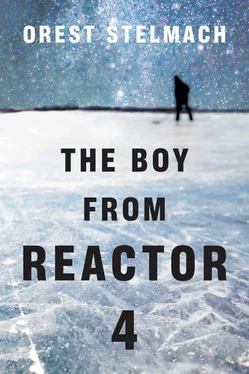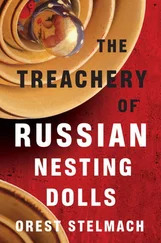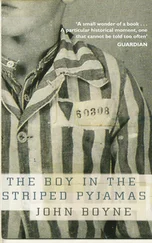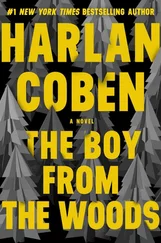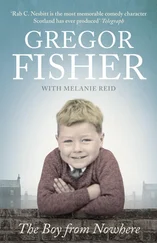She hustled up the ramp to the gate to catch up to Adam. Her quads and hamstrings ached. When she burst into the terminal, six armed Port Authority policemen and four burly men in suits surrounded an unremarkable businessman in a suit and tie. The man’s hands were cuffed behind his back, and one of the officers was searching his briefcase. Nadia looked around for Adam but couldn’t find him. She walked around the perimeter of the gate, checked the food court, and asked a restroom attendant washing the floor to check the men’s room for him. Adam wasn’t there.
Nadia finished where she’d started, at the gate where she’d arrived. As the cops escorted the businessman in cuffs out of the area, she realized that Adam must have emerged from the ramp to find cops converging. The men in plainclothes looked like Homeland Security agents—government men, to borrow Adam’s phrase. His paranoia was such that he had probably assumed they were there to arrest him and send him back to Ukraine. In a panic, he ran.
Adam didn’t speak English. He didn’t know anyone in America and didn’t understand the city. As Nadia wondered what she would do if she were in his shoes, she realized that she wasn’t as concerned about the locket as she was about Adam himself. Nadia remembered when her mother had paced the kitchen, wondering where her brother was and what harm might have come to him, when he disappeared for days as a teen.
Nadia bolted in search of a customer service desk. Halfway down the main aisle, her cell phone rang.
It was Johnny, calling with details of the meeting he’d arranged.
CHAPTER 78

ADAM DIDN’T HAVE time to stop and try to find someone who spoke Russian. He had to get out of the airport fast. He’d seen the government people as soon as he climbed up the ramp from the airplane. Fortunately, they didn’t recognize him because he was dressed differently and helping the old lady.
He found a perky woman in front of a computer with a first-aid symbol embedded in the sign above her desk. Adam had studied English in school and knew some basic words.
“New York City. Train. For downtown,” he said.
She answered so quickly he couldn’t understand a word. She also pointed down the corridor—didn’t Americans know it was rude to point?—and Adam took off in that direction. He followed others down a long stairwell, past a shiny silver carousel rotating with no luggage on it, and emerged in a giant lobby. Men in suits and ties held big white cards with words written on them. Other men, some of them not so well dressed, bombarded him with questions.
Adam had never seen so much dark skin in his life. He’d seen pictures of black men and Indian men, but he’d never seen them in person. It was incredible. This must be why the United Nations was in New York. Every type of person on the planet had to live in New York.
A beady-eyed woman behind a wall full of pictures of gleaming hotels helped him find the train. She drew a picture of an airplane beside a railroad track and slowly repeated a single word:
AirTrain.
After climbing stairs and finding the AirTrain, Adam gave the ticket man a twenty-dollar bill. The ticket man barked the word “peak” at him and gave him twelve dollars back. Adam didn’t understand what “peak” meant and guessed he was charged more for having two bags. It was just like Ukraine. People were looking to make money any way they could.
The AirTrain circled around JFK Airport like a limousine in the sky. Adam noticed a sign on the subway and realized that JFK stood for John F. Kennedy Airport. He felt a little less like a foreigner after he read this. After all, he was named after the former president’s brother.
Adam followed the ticket seller’s instructions and switched trains at a stop called Howard Beach. He paid $2.25 for a ticket for the underground A train. He made sure he was on the right train before boarding by asking two different people if he was headed downtown. They both nodded.
When the train arrived at Washington Square, Adam got out and climbed the stairs to the street. He gaped at the size of the buildings. Gawked at the number of people on the sidewalks. But mostly, he tried to contain an overwhelming sense of joy.
He pulled a piece of paper out of his pocket that his father had given him in case of emergency.
The first person he approached was a dapper man in a pinstripe suit.
“Excuse me,” Adam said, holding out the paper his father had given him. “To help, please?”
The man glared at Adam as though he were a criminal about to rob him and hurried by.
The second person Adam approached was a chic young woman with a miniskirt and legs as long as the skyscrapers around him.
“Excuse me,” Adam said, holding out the paper again. “To help, please?”
The woman took one look at him, wrapped her arms around her chest, and circled around him, leaving a berth far and wide, like a Kyivan who feared he might be radioactive.
Before Adam could approach a third person, a glamorous woman with dark skin ambled up to him. She had the shoulders of a Black Beret and a masculine face but wore makeup and high heels. In fact, Adam wasn’t sure if the person was a man or a woman, but he decided on the latter because only women wore high heels.
The woman said something and smiled. She had teeth the size of piano keys.
Adam showed her the paper.
She read what was on the paper and asked another question.
Adam pleaded with his eyes. “Downtown,” he said.
The woman studied Adam for a moment and then pointed to a bench. They sat down together. The woman removed a notepad from her briefcase and drew a beautiful map. She put a big X next to a square and pointed to the ground.
“Here,” she said.
Afterward, she drew a second X next to a street corner far away and pointed to the paper her father had given him.
“There,” she said.
Adam thanked her profusely in Ukrainian and took off toward the second X.
CHAPTER 79

AFTER KILLING MISHA, Kirilo had struck a bargain with his excellent bodyguard, Stefan, who’d saved him from being shot by the babushka. He put him and his crew on retainer, paying them the equivalent of US$50,000 to become his American security consultants. In fact, Kirilo was paying to prevent them from seeking retribution and to agree that Misha had left the casino complaining of stomach pains and had simply vanished with his friend Specter. If Specter was a musor , as Kirilo suspected, that would convince those who profited from Misha’s existence that he had turned snitch for the American police. Hence, no one would regret the moscal ’s disappearance.
That Stefan had worked for Victor previously was of no consequence. It was not unusual for men to shift allegiances as their bosses faded. Victor was on the decline. His power had eroded to younger men such as Misha. More important, he was broke. Stefan’s betrayal of Victor for Misha implied he was a rational economic being. He followed the money. Kirilo had money. Still, since some allegiances died hard, Kirilo instructed Pavel and his team of bodyguards to maintain a safe distance from him.
Two of Stefan’s men picked them up at Newark International on Saturday morning. Pavel, the bodyguards, and Stefan drove in one car. Kirilo and Victor rode in the other.
Victor had been on the cell phone when Kirilo finally got through Customs. Strangely, it made Kirilo happy to see him talking to his men in Kyiv because they were taking care of Isabella. Their line of dialogue brought Kirilo closer to his daughter, if only in his imagination.
Читать дальше
